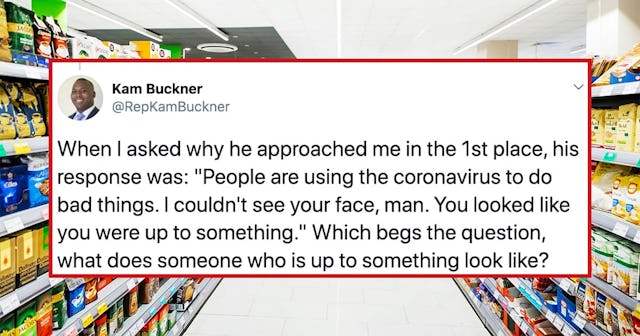COVID-19 Mask Requirements Mean I'm Not Taking My Black Kids To The Store Any Time Soon

He walked into a store wearing the required COVID19 protective mask that his state has mandated. He was dressed in a hoodie, sweatpants, and gym shoes, much like the other shoppers. He describes himself as a 6’4” black male from the southside of Chicago. Upon exiting the store, he was stopped by an officer and asked to produce his receipt and then his identification.
The shopper asked the officer why he was stopped. The officer replied, “People are using the coronavirus to do bad things. I couldn’t see your face, man. You looked like you were up to something.” The shopper, who is Democrat Illinois state representative Kam Buckner, tweeted, “Which begs the question, what does someone who is up to something look like?” Buckner’s incident, among the many others that have made the news, are why I won’t be taking my black children to the stores anytime soon.
My four children, all of whom are black, haven’t stepped foot in a store since the beginning of March when our state mandated a shelter-in-place order. Eventually, orders were issued to wear a mask at all times when entering a public space, including stores, and continue to practice social distancing. Certainly, wearing a mask and practicing distancing makes sense, but what doesn’t work for us is knowing that melanin-rich people in a mask will enact implicit bias, particularly in white people. All the BBQ Beckys and Cornerstore Carolines are ready to pounce, summoning the manager or security for the slightest inkling of fear. We had also observed heightened security in stores, either by internal security or city police.
Long before the coronavirus pandemic, my children have rules we have taught them that they must follow when shopping. For starters, they are not allowed to wear their hoods up or put their hands in their pockets. They are never allowed to shop unsupervised—not even my tweens. Running, yelling, or goofing around in the store is also a no-no. They are only allowed to touch the item they intend to purchase, placing it in the cart or basket. When they reach the cash register, they always, always must get a store-issued bag and a receipt. It doesn’t matter if they only have a pack of gum. Finally, they aren’t allowed to open their purchase until we are back in our car.
Their rules are in direct contrast to mine. As a white woman, I can freely meander around the store, sniffing all the candles, examining coffee options, and digging through my purse to find my phone. When I shop, I carry a reusable tote and place the items I’ve chosen into the bag. I make my way around the store, never worrying that a store employee or security officer will question what I’m doing or if I’m going to pay for my items. When I get to the cash register, I remove my items from my bag while the cashier makes small talk with me. They ask me if I’d like my receipt in my hands or placed in my bag. I breeze out of the store, no one stopping me—ever—and asking me to produce proof that I paid for the items.
What happened to Representative Buckner is all too common. Dr. Armen Henderson, a physician in Miami, was loading his van, parked outside his own home, with camping tents to distribute to the homeless. A police officer handcuffed him, suspecting him of littering. It was only when Dr. Henderson’s wife came out of their home with identification proving it was, in fact, their residence, that Dr. Henderson was released. The incident was caught on home security video.
In a series of tweets about his own security encounter, Representative Buckner shares that there were “scores of masked people” all around him, unencumbered by suspicion and interrogation, yet he was the one the officer deemed “up to something.” Buckner added in another tweet, “It bothers me most because I can’t help but think of the dangers that are inherent for a number of black men who are just adhering to the mask rule and by doing so, look like they are ‘up to something.’”
His sentiments about racism are spot-on. Recently in an Oklahoma gated community, a viral video shows a white male HOA president blocking a black male delivery driver, Travis Miller, from doing his job while demanding that the driver state what he’s doing and why he’s in the neighborhood. The incident happened just a few days after the video of ex-cop Gregory McMichael and his son Travis McMichael allegedly chasing and then murdering Ahmaud Arbery, a black man who was jogging through a Georgia neighborhood, was released.
All of these situations show that it doesn’t matter how educated, well-dressed, articulate, hard-working, or respectful a black person is. (Though white people love to tell me that my kids will be perfectly safe if they just act and look like upstanding citizens.) Their title or position in society doesn’t rescue them from racism. They are always at risk of being suspected and interrogated due to the color of their skin. They could be doing an everyday activity, like jogging, making a delivery, or shopping, and a white vigilante or biased security guard will take it upon themselves to get involved. When that person of color is wearing a mask, that heightens fears, creating an even more potentially dangerous situation.
No matter how much I prepare my children and how many rules we have in place, the COVID19 pandemic is presenting a frightful problem for people of color. Mandating masks, though necessary for public health, endanger the safety of some. As Representative Buckner tweeted that “COVID will not break us. It will only reveal to us what is already broken. There’s a lot to be fixed.”
This article was originally published on